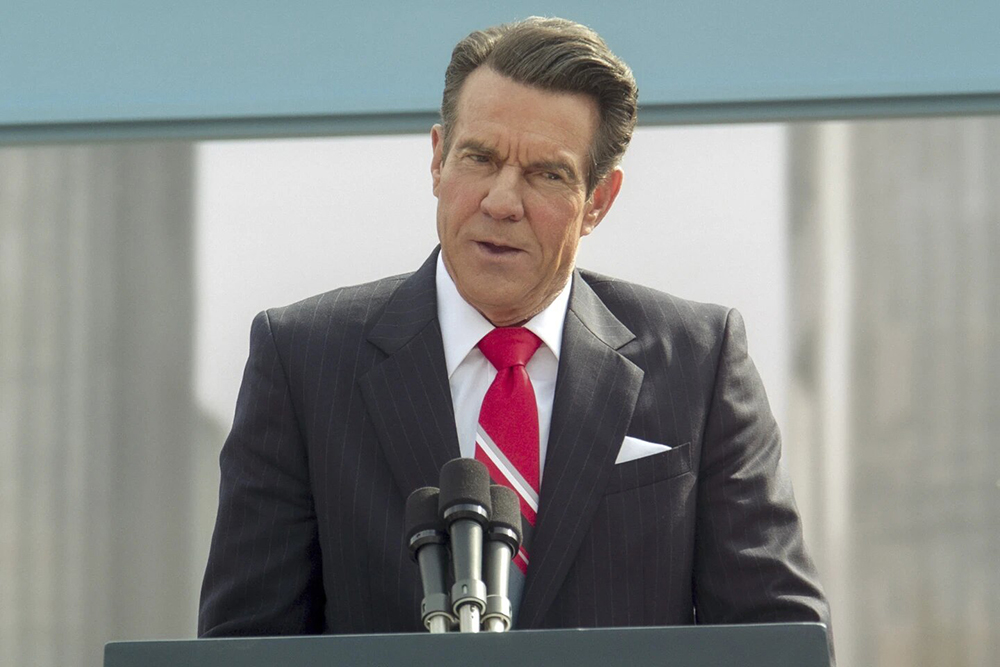|
Getting your Trinity Audio player ready...
|
By: Hal C Clarke
Several theaters in New York City and surrounding areas have declined to screen the new film Reagan, prompting accusations of “liberal bias” from Republicans. According to The New York Post, even the few theaters that opted to show the movie offered limited screenings, typically only once or twice per day.
The movie, starring Dennis Quaid as Ronald Reagan, explores the life and political career of the conservative icon who served as the 40th president of the United States. Despite Reagan’s landslide victory in 1984, when he won 49 of 50 states, some believe that the film’s restricted release reflects an effort to undermine its reach. John McLaughlin, a Republican pollster who worked for Reagan’s campaign, told The New York Post, “They’re trying to censor his success.” He suggested that the limited showings were driven by concerns that highlighting Reagan’s popularity could benefit former President Donald Trump, the current Republican nominee.
“Absolutely it’s liberal bias, Democratic bias,” McLaughlin said, adding that he believes “Big Tech, Big Media” have worked to prevent anything that could boost Trump’s campaign. Quaid himself, a known conservative, claimed that his role as Reagan had led to attempts to “cancel” him, as reported by The New York Post. Quaid even appeared at a Trump rally in California, further aligning his portrayal of Reagan with today’s conservative movement.
State Conservative Party Chairman Gerard Kassar expressed surprise over the limited showings, especially in New York City. “It’s ironic that a movie about Ronald Reagan is having a problem getting into movie theaters,” Kassar remarked to The New York Post. He noted that Reagan’s transition from Hollywood to the White House once made him a familiar face on the big screen, yet now, even in Kassar’s home turf of Brooklyn, the film faced obstacles.
Controversy has shadowed Reagan—directed by Sean McNamara—since its release. Ahead of the movie’s debut, producers worried about potential pushback from social media platforms like Facebook and Instagram, fearing that ads might be blocked due to the film’s political focus. Craig Shirley, a Reagan biographer and advisor on the film, acknowledged the challenges in liberal-leaning cities like New York. “I assume there was some resistance—some woke resistance,” Shirley told The New York Post. He noted that the film performed better in suburban and rural markets.
US Representative Nicole Malliotakis (R-NY), who serves Staten Island and Brooklyn, suggested that politics played a role in limiting the film’s screenings. “Reagan was one of the best presidents this country ever had, and his defeat of Jimmy Carter mirrors today’s campaign dynamics,” Malliotakis explained, drawing comparisons between the conservative platforms of Reagan and Trump. She argued that New York theaters, situated in a predominantly liberal environment, may have deliberately limited screenings to prevent parallels between Reagan’s time and current Republican messaging.
The film’s producer, Mark Joseph, declined to comment on the issue. However, The New York Post highlighted a statement from ShowBiz Direct, the movie’s distributor, which clarified that the company made the film available nationwide. “We made the picture available in all areas of the country regardless of the political persuasion of any individual marketplace,” said Richie Fay, an executive at ShowBiz Direct. He emphasized that it was ultimately up to the individual theaters to decide whether to screen the movie.





